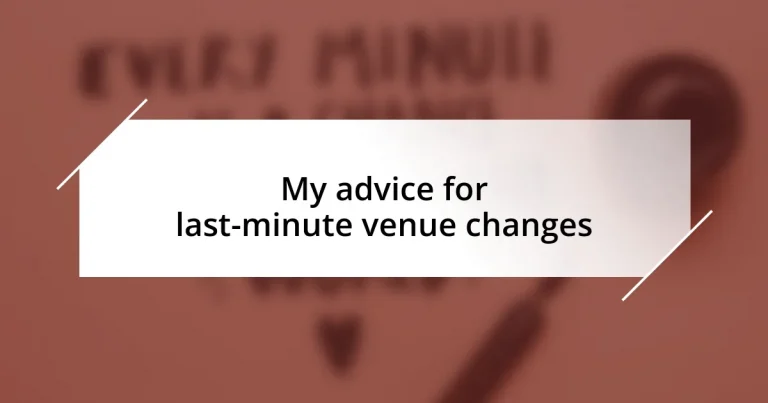Key takeaways:
- Last-minute venue changes can arise from various reasons such as double-bookings, severe weather, and personal emergencies, requiring flexibility and swift decision-making.
- Effective communication with guests and vendors is crucial during venue changes, using multiple channels such as messaging apps, social media, and phone calls to provide clarity and reassurance.
- Assessing alternative venues involves evaluating factors like capacity, location, and cost, which can turn a stressful situation into a creative opportunity.
- Ensuring a smooth transition requires briefing all parties involved, establishing clear roles, and fostering open feedback for continuous improvement.
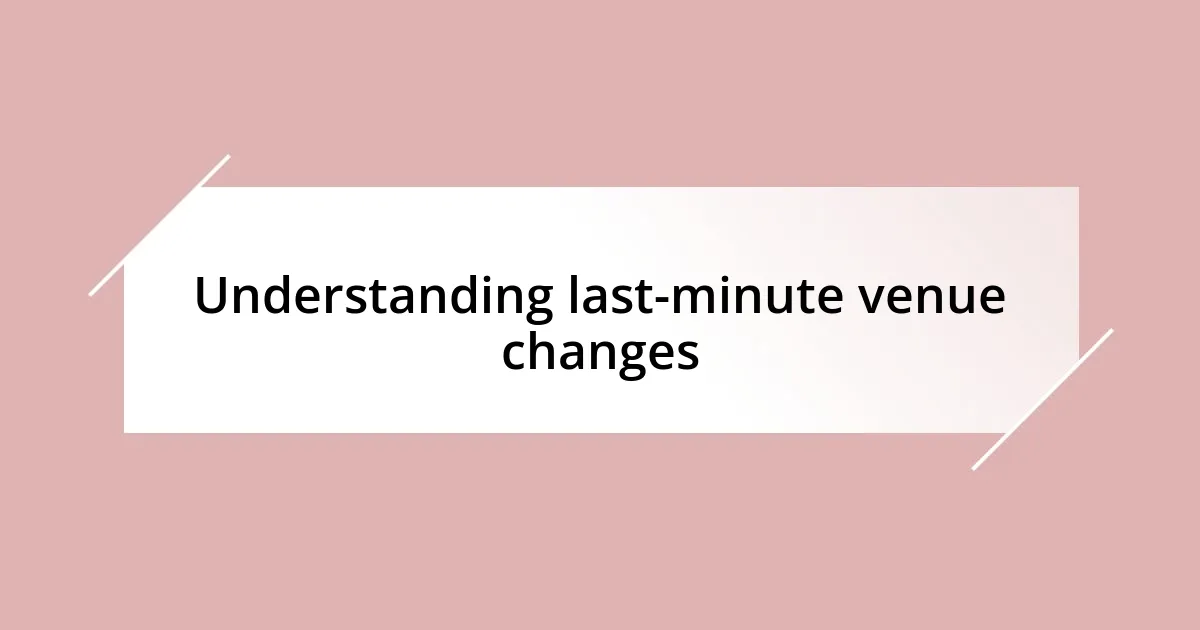
Understanding last-minute venue changes
Last-minute venue changes can feel like a whirlwind. I remember one time when a storm unexpectedly forced us to move an outdoor wedding indoors just hours before the ceremony. The pressure was immense, but seeing the couple’s determination reminded me of how adaptability can shine through in chaotic moments.
When planning an event, the venue is often a centerpiece of the experience. Have you ever attended a gathering in a space that felt just right? That connection is crucial, and when that changes suddenly, it can be unsettling for both organizers and guests. I find it fascinating how a shift in location can alter the entire atmosphere; it’s like changing the script in an unfolding drama.
Understanding the reasons behind these sudden changes, whether it’s weather, scheduling conflicts, or safety concerns, helps deepens our empathy. I’ve learned that sharing the story of what happened can forge connections among attendees, turning a stressful moment into a shared experience. How do you manage expectations during such surprises? I’ve discovered that clear communication can be a lifeline, reassuring everyone involved that the event will still be memorable, no matter the location.
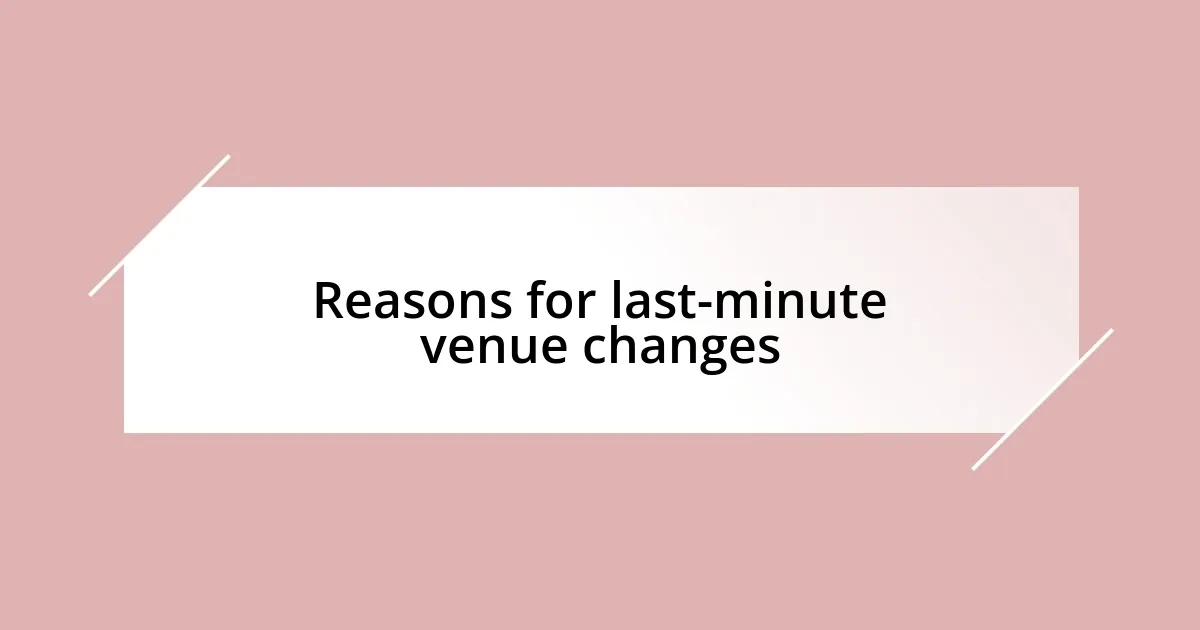
Reasons for last-minute venue changes
Changing a venue at the last minute can stem from a variety of reasons. I recall organizing a corporate event when the original venue abruptly informed us of a double-booking. It was frustrating, but such unexpected hurdles are more common than many realize. They remind me of the need for flexibility – after all, a great event can still happen under different circumstances.
Another situation that can drive last-minute changes is unforeseen circumstances, such as severe weather or health regulations. I once had to shift a summer festival indoors due to an unexpected downpour. The event went on, and attendees expressed their gratitude for the effort to keep things running smoothly. This experience reinforced how resilience can convert a challenging situation into an opportunity for creativity.
Sometimes, personal emergencies or logistical issues arise that force venue changes. I had an instance where a family emergency affected the host’s ability to maintain the planned space. We quickly found an alternative that suited the guests just as well. It’s in these moments that I’ve learned the importance of swift decision-making and having a backup plan. Having a trusted network of venues can make all the difference when you need to act fast.
| Reason | Example |
|---|---|
| Double-booking | Original venue is no longer available due to a scheduling conflict. |
| Severe weather | Outdoor events needing to relocate indoors due to unexpected storms. |
| Logistical issues | Personal emergencies prompting quick decisions about venue changes. |
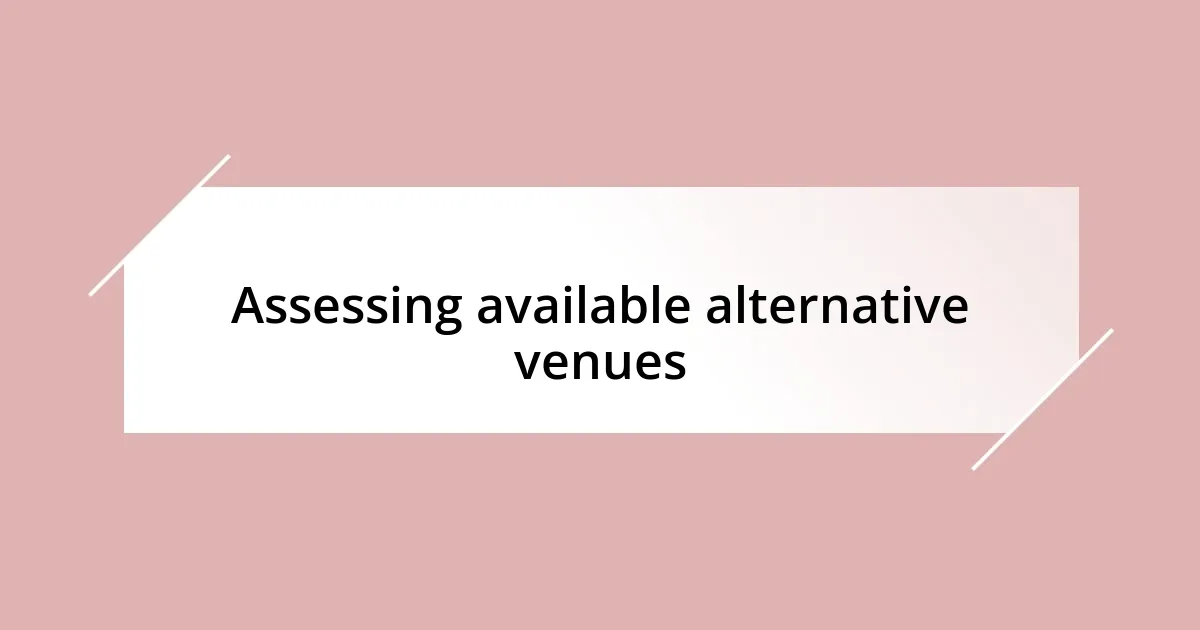
Assessing available alternative venues
I’ve learned that when assessing alternative venues, it’s crucial to keep an open mind. One time, I faced a sudden need to find a new location for a charity gala just days before the event. I was surprised by how many options existed, many of which I hadn’t initially considered. Each venue brought its unique charm and potential, and it reminded me that flexibility can lead to unexpected treasures.
Here are some factors to consider when assessing alternative venues:
- Capacity: Ensure the venue can accommodate your guest list comfortably.
- Location: Consider accessibility for attendees, especially if the original venue was in a central location.
- Facilities: Check for essential amenities, like parking, restrooms, and AV equipment needed for your event.
- Atmosphere: Evaluate whether the venue’s vibe aligns with your event’s theme.
- Availability: Confirm that the venue is open on your revised date and can accommodate your schedule.
- Cost: Assess whether the pricing fits within your budget, bearing in mind any added expenses from the last-minute change.
By making a thorough assessment, I’ve often discovered venues that not only matched the requirements but also added a special touch to the occasion. It can turn the day around, transforming what could be a stressful scramble into an opportunity for a fresh start.
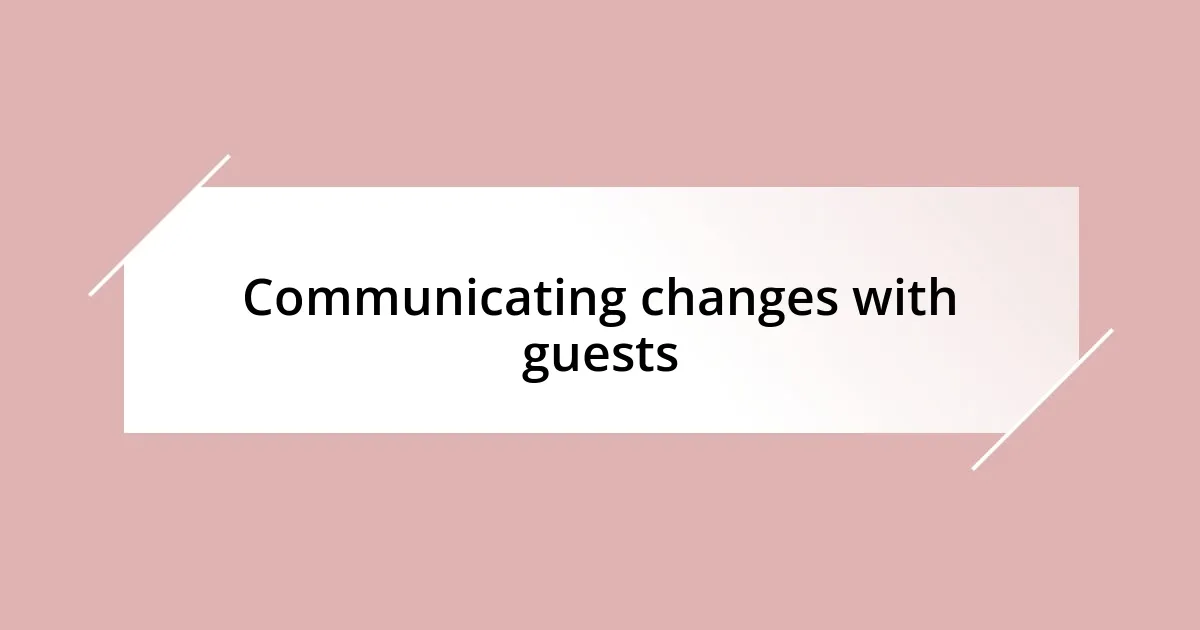
Communicating changes with guests
When it comes to communicating changes with guests, clarity is key. I vividly remember the chaos that ensued after I had to relocate a wedding just hours before the ceremony. I quickly sent out a group message through a popular messaging app, detailing the new venue along with a map link. This not only helped alleviate confusion but also reassured the guests that the celebration would continue as planned.
I always find it effective to follow up with phone calls, especially for important events. During one event I organized, a last-minute venue change led me to personally call those closest to the couple. Hearing their relieved voices prompted me to realize the impact of direct communication. It created a sense of intimacy and provided them the opportunity to ask any last-minute questions, which they greatly appreciated.
Using social media is another great tool that I lean on. One time, I faced an unexpected venue issue for a community fundraiser and I took to Facebook to announce the shift. The quick, live updates and positive comments from attendees created an enthusiastic buzz, reminding me that transparency not only informs but can also foster excitement. How do you often share updates during such moments? I’ve found embracing various channels maximizes the chances of reaching everyone effectively.
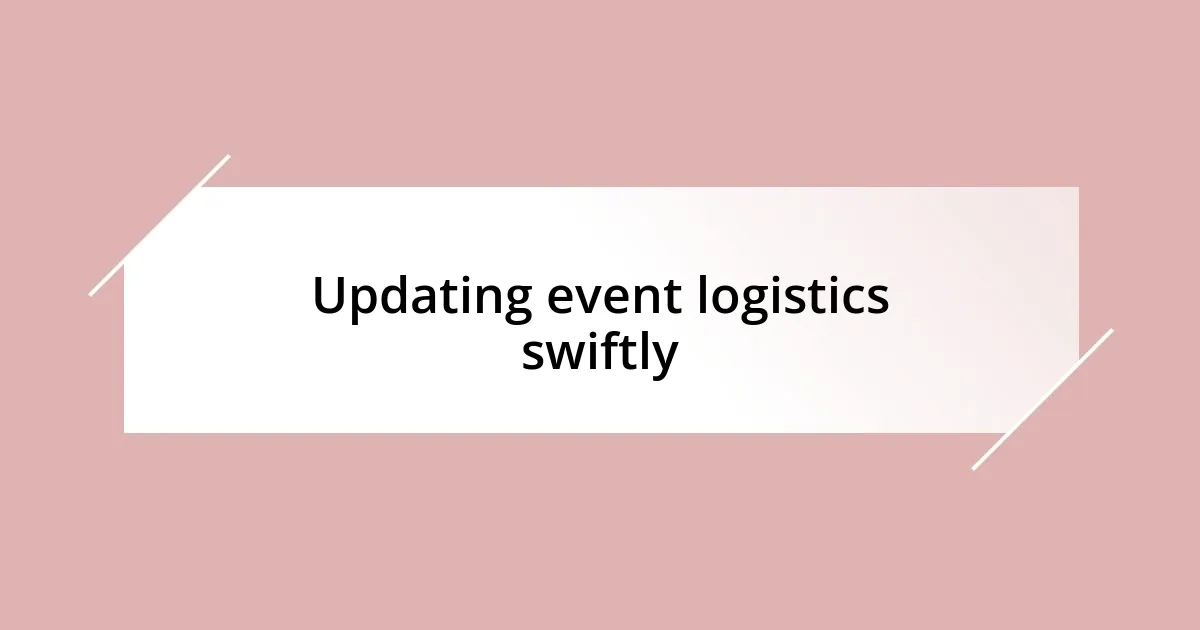
Updating event logistics swiftly
Updating event logistics swiftly is a challenge that requires a calm focus when the clock is ticking. I once had to adjust the event schedule dramatically for a corporate gathering due to an unforeseen venue change. In that situation, I created a centralized Google document where all logistical details—like the new timeline, transportation options, and accommodations—were shared. This allowed my team to stay on the same page and respond efficiently to any questions that arose.
In my experience, utilizing technology for real-time updates makes a world of difference. I remember a charity event where catering had to be shifted at the last minute. I set up a group chat for instant communication among vendors, which helped address concerns as they surfaced. I realized that being proactive and ensuring all parties are informed creates a seamless experience—it’s about building a sense of teamwork when time is of the essence.
Last-minute changes can feel overwhelming, but I find that staying organized and calm is essential. Can you recall a time when everything seemed to be unravelling? When I faced a sudden shift, I resorted to color-coded checklists that prioritized tasks effectively. This method not only helped me regain control but also served as a visual reminder of what still needed to be completed, making the process more manageable. By embracing a systematic approach, I believe we can transform chaos into clarity.
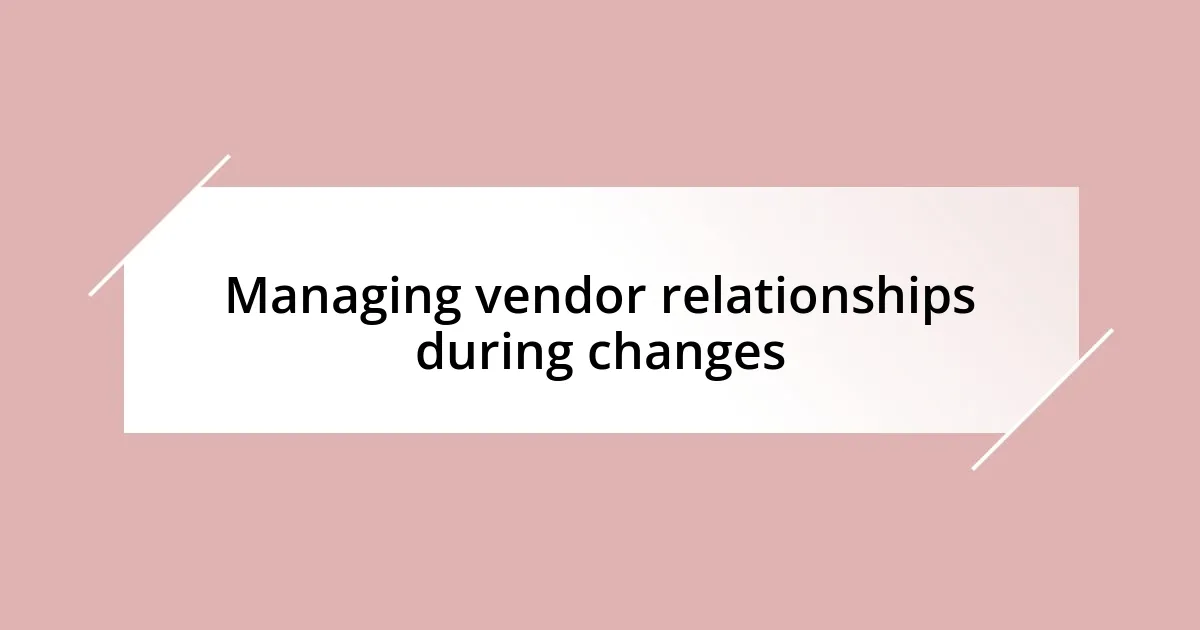
Managing vendor relationships during changes
Just like with any significant change, managing vendor relationships during a venue shift demands attention and care. I recall a particularly hectic event where a last-minute venue change threatened to derail several vendor arrangements. I made it a priority to reach out to each vendor personally and discuss the implications of the change, allowing them to express their concerns. This open dialogue not only built trust but also encouraged collaboration to find solutions that worked for everyone involved.
One effective tactic I’ve found is being transparent about the challenges we’re facing. There was a time when a catering team was stressed about the sudden shift, fearing they wouldn’t meet the new venue’s demands. I took the time to reassure them, sharing my own apprehensions and acknowledging their expertise. That moment of vulnerability turned what could have been a tense situation into a supportive partnership, where we brainstormed ideas together.
Keeping communication channels open is a game changer. I once encountered a situation where a florist had to adjust their delivery due to unexpected traffic. By setting up a quick call to discuss the new timing, we were able to coordinate efficiently and avoid any last-minute surprises. Do you ever feel that simply hearing someone’s voice can ease tension? I’ve learned that small gestures in these situations, like a brief check-in, can work wonders in maintaining positive relationships with vendors amid chaos.
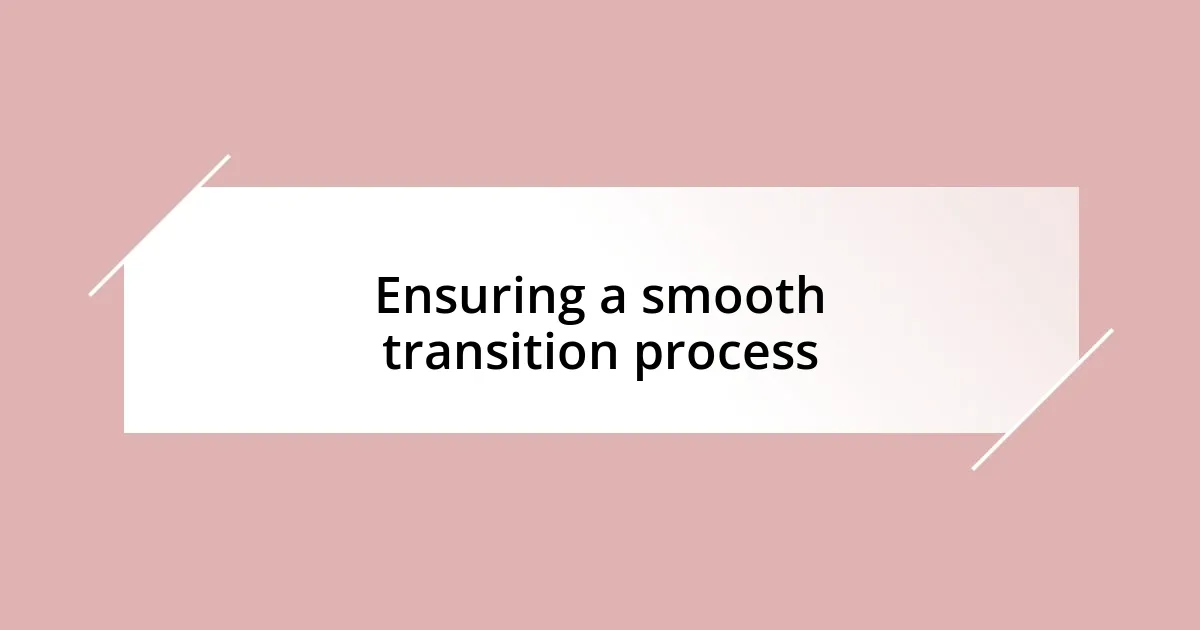
Ensuring a smooth transition process
Ensuring everyone involved is fully briefed on the changes is essential for a smooth transition. I once faced a sudden venue switch for a wedding, and my heart raced at the thought of disappointing the couple. I gathered all the involved parties into a quick video call, where I explained the new plan, timeline, and any changes to their responsibilities. That face-to-face interaction transformed their initial anxiety into a collective commitment to make it work, reinforcing that we were in this together.
Another aspect I focus on is establishing clear roles during times of transition. When I had to move an outdoor music festival to a different location, my team felt scattered with urgent tasks. I implemented a buddy system, pairing people up to tackle specific areas of concern together. Not only did this foster teamwork, but it also eased the burden of decision-making and helped everyone feel supported in tackling challenges. Have you ever found that sharing the load makes a project feel less daunting? I certainly have.
Lastly, I believe in leaving space for feedback after the transition. I remember wrapping up an event at a newly-sourced venue and seeking input from my team about what worked and what didn’t. This open forum made everyone feel heard, allowing us to gather invaluable insights that informed our planning for future events. In my experience, these reflections are just as critical as the event day itself—it’s all part of a continuous learning journey. How do you ensure that every experience contributes to your growth? This is something I consistently strive to incorporate into my process.












